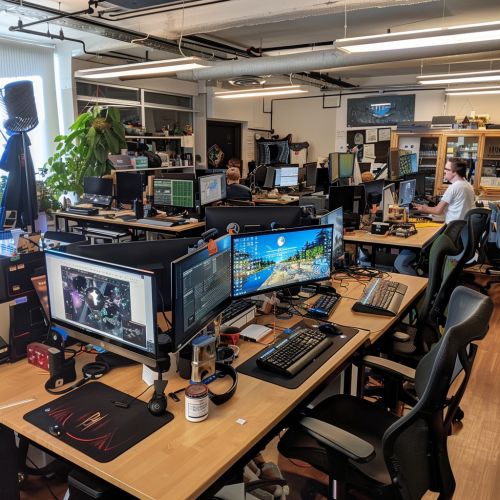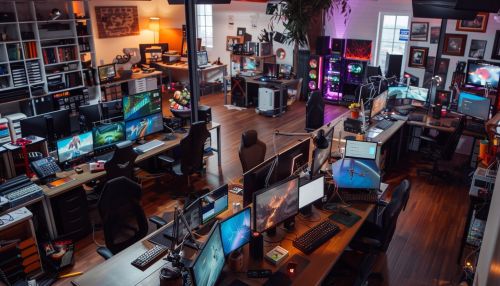Game producer
Overview
A game producer is a person who oversees, coordinates, manages, and is responsible for the completion of a video game project. They work closely with the development team and other stakeholders to ensure that the project is delivered on time, within budget, and to the agreed quality standards. The role of a game producer is often compared to that of a film producer, as they both involve managing a team of creative professionals to deliver a complex, multi-faceted product.
Role and Responsibilities
The game producer's role varies depending on the size and structure of the development studio. In a large studio, a game producer may be responsible for a specific aspect of the game, such as art, design, programming, or marketing. In a smaller studio, the producer may have a more hands-on role, directly involved in the creation and development of the game.


The game producer's responsibilities typically include:
- Project Management: The game producer is responsible for managing the game development process from concept to completion. This includes creating and maintaining a project plan, tracking progress against milestones, managing the project budget, and ensuring that the team is working effectively and efficiently.
- Team Management: The game producer is responsible for managing the development team. This includes hiring and training staff, assigning tasks, managing performance, and resolving conflicts.
- Communication: The game producer is the main point of contact between the development team and other stakeholders, such as publishers, investors, and marketing teams. They are responsible for communicating the project's status, risks, and issues, and for ensuring that all stakeholders are aligned on the project's goals and objectives.
- Quality Assurance: The game producer is responsible for ensuring that the game meets the agreed quality standards. This includes overseeing the quality assurance process, managing bug tracking and resolution, and ensuring that the game is ready for release.
- Marketing and Promotion: The game producer may also be involved in marketing and promoting the game. This includes working with marketing teams to develop marketing materials, coordinating promotional activities, and managing the game's release.
Skills and Qualifications
A game producer needs a wide range of skills and qualifications, including:
- Project Management Skills: A game producer must be able to manage complex projects, with multiple tasks and deadlines. This includes planning and organizing skills, problem-solving skills, and the ability to manage budgets and resources.
- Communication Skills: A game producer must be able to communicate effectively with a wide range of people, from developers and artists to publishers and investors. This includes strong written and verbal communication skills, as well as the ability to present complex information in a clear and concise way.
- Leadership Skills: A game producer must be able to lead a team of creative professionals. This includes the ability to motivate and inspire the team, to manage performance and resolve conflicts, and to create a positive and productive work environment.
- Technical Knowledge: A game producer must have a good understanding of the technical aspects of game development. This includes knowledge of game design, programming, art and animation, sound design, and quality assurance.
- Industry Knowledge: A game producer must have a good understanding of the video game industry, including market trends, consumer preferences, and the competitive landscape.
In terms of qualifications, a game producer typically has a degree in a related field, such as game design, computer science, or business management. They also usually have several years of experience in the video game industry, often starting in a junior role and working their way up.
Career Path
The career path for a game producer can vary greatly depending on the individual's skills, interests, and career goals. Some game producers start their careers in other roles within the video game industry, such as game designer, programmer, or artist, and then move into a producer role as they gain experience and develop their management skills.
Others may start their careers in related industries, such as film or television production, and then transition into the video game industry. Some game producers also move into executive roles within a game development studio, such as studio manager or executive producer.
Regardless of the specific career path, becoming a game producer typically requires a combination of technical skills, management skills, and industry experience.
